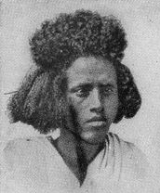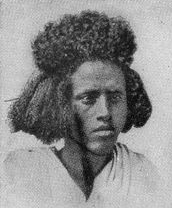
Fuzzy-Wuzzy
Encyclopedia
- See Fuzzy Wuzzy (disambiguation) for other meanings
Fuzzy-Wuzzy is a poem by the English author and poet Rudyard Kipling
Rudyard Kipling
Joseph Rudyard Kipling was an English poet, short-story writer, and novelist chiefly remembered for his celebration of British imperialism, tales and poems of British soldiers in India, and his tales for children. Kipling received the 1907 Nobel Prize for Literature...
, published in 1892 as part of Barrack Room Ballads. It describes the respect of the ordinary British soldier for the bravery of the Hadendoa warriors who fought the British army in the Sudan.
Background

Hadendoa
Hadendoa is the name of a nomadic subdivision of the Beja people. Other Beja tribes include the Bisharin and Ababda. The area inhabited by the Hadendoa is today parts of Sudan, Egypt and Eritrea.-Overview:...
warriors supporting the Sudanese Mahdi
Muhammad Ahmad
Muhammad Ahmad bin Abd Allah was a religious leader of the Samaniyya order in Sudan who, on June 29, 1881, proclaimed himself as the Mahdi or messianic redeemer of the Islamic faith...
in the Mahdist War
Mahdist War
The Mahdist War was a colonial war of the late 19th century. It was fought between the Mahdist Sudanese and the Egyptian and later British forces. It has also been called the Anglo-Sudan War or the Sudanese Mahdist Revolt. The British have called their part in the conflict the Sudan Campaign...
. The name "Fuzzy-Wuzzy" may be purely English in origin, or it may incorporate some sort of Arabic
Arabic language
Arabic is a name applied to the descendants of the Classical Arabic language of the 6th century AD, used most prominently in the Quran, the Islamic Holy Book...
pun (possibly based on ghazī
Ghazw
Ghazi or ghazah is an Arabic term that means "to raid/foray." From it evolved the word "Ghazwa" which specifically refers to a battle led by the Islamic prophet Muhammad.In English language literature the word often appears as razzia, deriving from French, although it probably...
, "warrior"). It alludes to their butter-matted hair which gave them a distinctive "fuzzy" look.
The Beja people
Beja people
The Beja people are an ethnic group dwelling in parts of North Africa and the Horn of Africa.-Geography:The Beja are found mostly in Sudan, but also in parts of Eritrea, and Egypt...
were one of two broad multi-tribal groupings supporting the Mahdi, and were divided into three tribes. One of these, the Hadendoa, was nomadic along Sudan's Red Sea
Red Sea
The Red Sea is a seawater inlet of the Indian Ocean, lying between Africa and Asia. The connection to the ocean is in the south through the Bab el Mandeb strait and the Gulf of Aden. In the north, there is the Sinai Peninsula, the Gulf of Aqaba, and the Gulf of Suez...
coast and provided a large number of cavalry
Cavalry
Cavalry or horsemen were soldiers or warriors who fought mounted on horseback. Cavalry were historically the third oldest and the most mobile of the combat arms...
and jihādiyya (referring to mounted infantry
Mounted infantry
Mounted infantry were soldiers who rode horses instead of marching, but actually fought on foot . The original dragoons were essentially mounted infantry...
units). They were armed with swords and spears and some of them carried breech-loaded rifles which had been captured from the Egyptian forces, and some of them had acquired military experience in the Egyptian army.
The poem
Kipling's poem Fuzzy-Wuzzy praises the HadendoaHadendoa
Hadendoa is the name of a nomadic subdivision of the Beja people. Other Beja tribes include the Bisharin and Ababda. The area inhabited by the Hadendoa is today parts of Sudan, Egypt and Eritrea.-Overview:...
for their martial prowess, because "for all the odds agin' you, Fuzzy-Wuz, you broke the square." This could refer to either or both historical battles between the British and Mahdist forces where British infantry square
Infantry square
An infantry square is a combat formation an infantry unit forms in close order when threatened with cavalry attack.-Very early history:The formation was described by Plutarch and used by the Romans, and was developed from an earlier circular formation...
s were broken. The first was at the Battle of Tamai
Battle of Tamai
The Battle of Tamai took place on March 13, 1884 between a British force under Sir Gerald Graham and a Mahdist Sudanese army led by Osman Digna....
, on 13 March, 1884, and the second was on 17 January, 1885 during the Battle of Abu Klea
Battle of Abu Klea
The Battle of Abu Klea took place between the dates of 16 and 18 January 1885, at Abu Klea, Sudan, between the British Desert Column and Mahdist forces encamped near Abu Klea...
. Kipling's narrator, an infantry soldier, speaks in admiring terms of the "Fuzzy-Wuzzies", praising their bravery which, although insufficient to defeat the British, did at least enable them to boast of having "broken the square"—an achievement which few other British foes could claim. The poem takes a satirical look at the British soldiers of the time who perceived themselves as invincible.
Other references
In the film Chitty Chitty Bang BangChitty Chitty Bang Bang
Chitty Chitty Bang Bang: The Magical Car is a children's book written by Ian Fleming for his son Caspar, with illustrations by John Burningham...
, Caractacus' father refers to the "Fuzzy-Wuzzys" when speaking of his time in the army. Additionally, in the BBC
BBC
The British Broadcasting Corporation is a British public service broadcaster. Its headquarters is at Broadcasting House in the City of Westminster, London. It is the largest broadcaster in the world, with about 23,000 staff...
situation comedy Dad's Army
Dad's Army
Dad's Army is a British sitcom about the Home Guard during the Second World War. It was written by Jimmy Perry and David Croft and broadcast on BBC television between 1968 and 1977. The series ran for 9 series and 80 episodes in total, plus a radio series, a feature film and a stage show...
, Lance Corporal Jack Jones (Clive Dunn
Clive Dunn
Clive Robert Benjamin Dunn OBE is a retired English actor, comedian and author, best known for his role as Lance-Corporal Jack Jones in the BBC sitcom Dad's Army.-Early life:...
) continually refers to the Fuzzy-Wuzzies in his reminiscences about his days fighting in the Sudan under General Kitchener
Herbert Kitchener, 1st Earl Kitchener
Field Marshal Horatio Herbert Kitchener, 1st Earl Kitchener KG, KP, GCB, OM, GCSI, GCMG, GCIE, ADC, PC , was an Irish-born British Field Marshal and proconsul who won fame for his imperial campaigns and later played a central role in the early part of the First World War, although he died halfway...
.
External links
- Historical background to the Kipling poem
- Kipling.org line-by-line explanation of references

